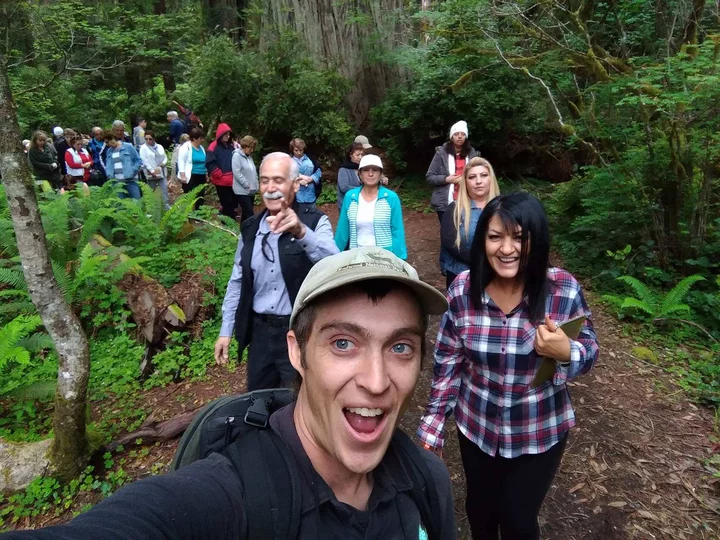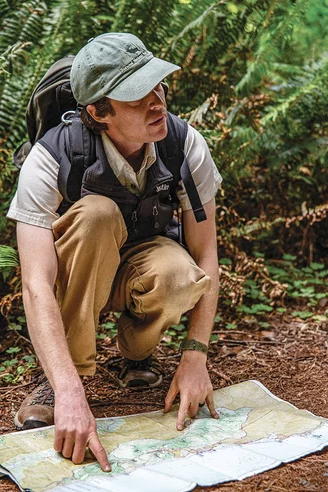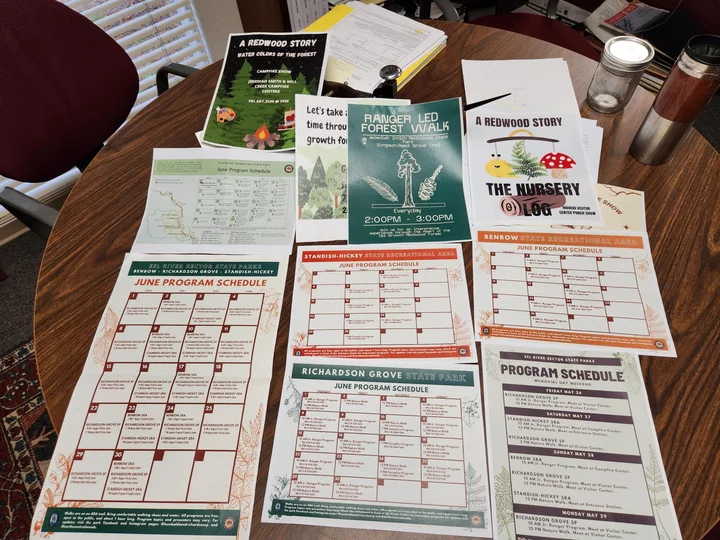Suspect in Tonight’s McK Homicide Named; Residents Urged to be Vigilant
LoCO Staff / Monday, July 3, 2023 @ 11:04 p.m. / Crime
Press release from the Humboldt County Sheriff’s Office:
The Humboldt County Sheriff’s Office is searching for the suspect of a homicide occurring in McKinleyville Monday evening.
The suspect, 26-year-old Jasen Dwain Coley, is wanted in connection to a fatal shooting on July 3, 2023, outside a residence on the 2200 block of Silverbrook Court. Sheriff’s deputies were called to the home at about 5:25 p.m. where they located a deceased adult male with a gunshot wound.
Coley is reported to have fled the scene. Deputies were contacted by residents in the Hiller Park area reporting a suspicious person matching Coley’s description. Despite extensive search efforts, including air support from the California Highway Patrol, law enforcement was unable to locate Coley.
Jasen Coley is described as a white male, approximately 5 feet 8 inches tall, heavy-set, with brown hair, brown eyes and facial hair. He was last seen wearing a black shirt, dark pants and a light-colored hat. He may be in possession of a rifle or a shotgun.
Coley may be associated with a dark blue 2016 Hyundai Elantra, Tennessee license plate # 015BKGM.
McKinleyville residents are asked take extra precautions such as locking all doors to your residence and not opening your door to strangers. Please report any suspicious persons or circumstances immediately to the Humboldt County Sheriff’s Office at 707-445-7251, ext. 0.
This case is still under investigation. Identity of the deceased is being withheld pending next of kin notifications. More information will be released when available and appropriate.
BOOKED
Today: 6 felonies, 9 misdemeanors, 0 infractions
JUDGED
Humboldt County Superior Court Calendar: Friday, Feb. 13
CHP REPORTS
0 SR36 (RD office): Chain Control
250 Mm271 S Men 2.50 (HM office): Closure of a Road
ELSEWHERE
100% Humboldt, with Scott Hammond: #108. Leslie Castellano—Art, Transit, And A Kinder Eureka
RHBB: RV Fire Near Founders Grove
Politico Magazine: The Friday Read ‘The Industry Comes In and Kills the Work of Local Citizens’
The Guardian: Anatomy of an upset: how Ilia Malinin lost Olympic figure skating gold
Local Naturalist Blasts Humboldt Redwoods State Park’s ‘Out of Control’ Policy Prohibiting Guided Tours After Years of Permitting Woes and Roadblocks
Isabella Vanderheiden / Monday, July 3, 2023 @ 8:10 a.m. / News
Justin Legge poses with a group of tourists on a guided walk through Prairie Creek Redwoods State Park. Photos contributed by Justin Legge unless otherwise stated.
###
Justin Legge is a passionate local naturalist who wants to share his love of Humboldt’s natural beauty with, well, just about anyone.
In the last decade, he’s led hundreds of tours throughout Northern California, ranging from kayak outings on Trinidad Harbor, botanical tours of the Lanphere Dunes Preserve, backpacking excursions in the Trinity Alps to guided forest therapy experiences among some of the tallest, oldest trees in the world. He regularly leads guided tours through Redwood National and State Parks in the northern reaches of the county. But try as he might he isn’t able to take his business down to Humboldt Redwoods State Park along Avenue of the Giants because he cannot obtain the required permits.
“I’m just completely roadblocked from doing anything. It’s out of control,” Legge told the Outpost in a recent interview. “There is precedent for California State Parks allowing and permitting guides to do private guided experiences. … I’m just trying to do this for my community because I love this place, and I feel this policy is detrimental to the protection, education and conservation of the redwoods.”
It all started about three years ago, when Legge was hired on as the general manager of the Benbow KOA and tour director and lead naturalist at the Benbow Historic Inn, just south of Garberville. Working alongside his employer, John Porter, Legge planned to build a vibrant naturalist program and tourism experience for folks visiting the region. That’s when he made his first attempt to bring private guided tours to Humboldt Redwoods State Park.
He applied for a Special Event Permit, but it was denied. Undeterred, he applied for a Commercial Use Authorization (CUA) permit. Months later, that application was denied as well.
“I was told that [the CUA permit] application – which I found on their website – doesn’t actually exist anymore,” Legge said. “I was told on another occasion that they never had the permit, that it was not a thing they ever offered. … It soon became painfully obvious to me that this challenge would not be surmountable, or at least not at that time. But let me tell you, I don’t know if it will ever be surmountable.”
Legge seems to be more than qualified to lead tours in the park, having worked in several positions as an educational tour guide and as an interpretive ranger with U.S. Forest Service. He’s studied outdoor recreation at Cal Poly Humboldt and is a certified naturalist through the University of California Agriculture and Natural Resources. He’s also served as an emergency medical technician and a wilderness first responder. So, what gives?
According to California State Parks spokesperson Adeline Yee, Legge is seeking the wrong permit. Humboldt Redwoods State Park “does not fall under the National Park Service’s [Commercial Use Authorization] CUA agreement,” she said.
“The three state parks – Jedediah Smith Redwoods State Park, Del Norte Coast Redwoods State Parks and Prairie Creek Redwoods State Park – within Redwood National and State Parks are co-managed by the National Park Service, and therefore, permits are issued by the National Park Service for these three park units,” Yee wrote in an email to the Outpost. “The National Park Service has agreements in place that are different than State Parks, including the CUA. CUAs allow for guided experiences to occur within park boundaries, but all business activities, including the collection of fees, occur outside of park boundaries.”
Legge acknowledged that CUA agreements are “not standard” in California State Parks, however, “there are multitudes of State Parks that enable commercial use permits for activities – such as guided tours – [through] a Special Event Permit,” he said. “I have spoken to outfitters at Mt. Diablo State Park and Crystal Cove State Park that have explained the same process. This is possible.”
Aaron Ostrom, co-owner of Pacific Outfitters and Bigfoot Adventure Academy, has encountered the same issues. Like Legge, his business is authorized to operate within the northern parks but he hasn’t had any luck getting permitted to operate in Humboldt Redwoods State Park.
“We’ve tried to get permits from [Humboldt Redwoods State Park] similar to the other parks but we’re met with roadblock after roadblock,” Ostrom said during a recent interview. “I’ve done some research with Justin [Legge], and it’s not clear why there isn’t a straightforward permit process for guided tours at this park. … Other parks have come up with a permit process that works within the boundary lines and the guidelines that they have. We’re just trying to get set up here.”
Ostrom recognized the park’s obligation to protect its natural and cultural resources but pointed out the irony in the park’s refusal to allow private guided tours while simultaneously allowing tourists to wander around the park unsupervised.
“There are tour buses that show up to that park and they drop off 50 or 60 people at a time with no guide and that’s okay, but doing guided tours with one to six people where there’s a guide to help supervise isn’t,” he said. “All of a sudden, there are issues with parking lots full of people and trail erosion. It’s just kind of a head-scratcher. All of our guides – all of the guides that I know – are out there being good stewards of the environment. These are the people who you want as allies. They’re assets to these parks and they’re being treated like liabilities.”
After months of back and forth with state parks staff, Legge was eventually told he could submit a concession proposal to provide guided tours for district evaluation. Concessionaires offer services and goods that the state cannot otherwise provide, ranging from full-service restaurants and retail sales to educational programs and tours.
To apply, the interested party is required to submit a concession proposal, launching a request for proposals (RFP) or bid process “which establishes fair market rent for the specific concession opportunity,” according to California State Parks. Concessions can be proposed by a member or the public, an entrepreneur or corporation, a district superintendent, a legislative mandate, or a local agency under an existing operating agreement with State Parks.
Legge submitted a proposal. It was not accepted.
According to Yee, the State Parks spokesperson, all concessions proposals and special event permit requests are evaluated by the district superintendent or their designee and “may be denied for a range of reasons, including if the service is already being provided by district staff, as is the case with tours at Humboldt Redwoods State Park.”
Reached for additional comment on the matter, North Coast Redwoods District Superintendent Victor Bjelajac said educational tours are already provided by park staff.
“What these folks are trying to do with guided walks is a service that we already provide,” he continued. “In our busy season, we provide interpretive programming all over the place, which includes guided tours. … When we ask somebody to provide services it’s because we can’t. When we do provide those services – which we do – and allow somebody to come in and compete, we get into bargaining unit problems and take away State Park jobs that are already occupied.”
The North Coast Redwoods District offers daily interpretive programming and events during the summer months. Here are some of the events that were offered in June. Photo: Victor Bjelajac
Bjelajac said he would be willing to talk to Legge more about his proposal “if it’s a service that we don’t provide and it’s a benefit to the public.” He noted that there are no concessions businesses currently operating within the park, adding that he has not received any proposals – from Legge or anyone else – to do so.
“They were told many times that they [could] develop a proposal for a concession agreement,” he said. “They said, ‘That’s too much work. We’re not going to do that.’ … I think Mr. Legge is aware of the CUA mechanism that National Parks has and he wants to go through an easier process but … we don’t have that tool.”
Legge pushed back against Bjelajac’s claim, asserting that the park refused to accept his application.
“They have denied the starting of the process multiple times to multiple different people, including myself,” he said. “Officially, sure, I guess they can say they have not ‘officially denied a concessions application’ because they are refusing to accept any. I have requested, and been denied multiple times.”
For that very reason, Legge feels a concessionaire agreement “just doesn’t make sense” for private guided tours, adding that “it’s too similar” to the services already being provided by the state.
“I feel like they’re just making us run in circles,” he said. “I understand that, as the superintendent, this is his park. He has a right to have a prohibitive policy, but please just say, ‘This is not happening,’ and stop playing this game of ‘you can do this, you can try that.’ It’s actually pretty uncommon to have a parks superintendent be 100 percent prohibitive.”
A prohibitive policy has implications beyond the park’s borders.
Increased tourism opportunities at Humboldt Redwoods State Park could provide a much-needed shot in the arm for Southern Humboldt communities struggling to stay afloat following the collapse of the local cannabis industry.
“Humboldt Redwoods State Park is our number one tourist draw and we cannot use it,” Legge said. “I can’t even quantify really the economic value of what we lose.”
Legge reached out to Gregg Foster, executive director of the Redwood Region Economic Development Commission, to try to get a better idea of the economic benefits of growing tourism in the region. He couldn’t offer a specific dollar amount, but he emphasized that the park is “an important asset to the tourist economy in Southern Humboldt.”
“I believe that the state does have a responsibility to consider the economic health of the communities that are adjacent to and surrounded by the park,” Foster said. “Many of these communities are suffering from the crash of the cannabis economy, which was brought on, in large part, by poor regulatory and tax policy at the state level. While the State Parks may not have played a role in this policy, I do believe that all state agencies are part of a greater whole and, as such, have a responsibility in supporting the health of our communities.”
The more robust services are offered to tourists, the better it will be for the economy as a whole, he added.
“State Parks resources are spread thin and I do believe they are doing the best they can with what they have, but the state should seek ways to be a good neighbor by including local businesses and communities in their plans and services,” Foster said. “It’s not enough to just invest in park assets, I believe that active and authentic engagement with the communities that they affect is necessary as well. The state should not only care about the natural resources of the park, they should also care about the communities surrounded by and adjacent to park lands.”
Legge and Ostrom have also brought this matter to the attention of local and state elected officials. The two met with state Senator Mike McGuire last month to try to find a resolution to the permitting issue. When asked how the meeting went, Legge said, “It was interesting.”
“They had a [separate] meeting with the park people – the superintendents and the higher-ups – and they told them things that they’ve never told us that seemed very incongruent to the conversation,” Legge continued. “The one thing that I’m stuck on is [parks staff] saying that they never had [the CUA] permit, that it is not a thing that they ever offered. But it was uploaded to their site to be filled out. … They told Senator McGuire’s office that it was uploaded by a rogue employee that never got permission to do that and that never should have been published.”
The CUA permit application, which was downloaded by Legge sometime in 2020 or 2021 and shared with the Outpost, looks to be a standard document. “Commercial Use Humboldt Redwoods Park” is denoted in the upper right corner of the application, so it appears to be specific to the park.
However, Bjelajac maintains that the “mechanisms haven’t changed.”
“I understand what he wants to do and there just aren’t mechanisms for what he wants,” Bjelajac continued. “It has been very clear and it’s been explained to him many times over the last few years.”
When asked for additional information on the recent meeting, McGuire said he would continue to work with park staff on the issue in the coming months.
“Knowing the special importance of Humboldt Redwoods’ world-famous beauty and world-renowned ecosystem, we are working to ensure its long-term protection while providing consistency and equal opportunity for visitors in our beloved State Parks,” McGuire wrote in a statement to the Outpost. “We have met with prospective tour guide operators as well as state park officials – and we all want the same thing – to provide the best experience possible for Park visitors.”
###
Hat tip to SFGATE reporter Ashley Harrell who originally reported on this story.
HAPPY BIRTHDAY, AMERICA! Choose Your Own Humboldt Fourth of July Adventure With Our Handy Guide to Local Festivities!
Hank Sims / Monday, July 3, 2023 @ 8 a.m. / Event
Get hype for America Day!
Someday someone will tell me why Humboldt — a traditionally America-skeptical place — goes all-out for the Fourth of July, but go all out it does. As with most years, we have stuff going on all up and down the county for the holiday.
Having trouble deciding where to go and how to celebrate? Here’s a probably incomplete rundown.
I want to celebrate the Fourth of July on the Third of July.
Get down to Fortuna
tonight! Down in the Friendly City they’re doing the whole damn
thing a day early, and they’re doing it up in family-friendly style! We’re talking about clowns, balloon animals, a petting zoo and not one bounce house, not two bounce houses, nor yet three bounce houses … but FIFTEEN FRICKIN BOUNCE HOUSES.
When night falls, things start to get loose. At 8:30 p.m., the bounce houses and clowns and goats are swept into the corner and the dance party begins. We’re talking about a laser light show. We’re talking fire dancers. That goes on until 10 p.m., when the skies erupt in flame! They don’t call it the Fortuna Fireworks Festival for nothing!
The fun starts at 5:30 p.m. at Newburg Park. Admission is free, but you gotta shell out $10 for a kid’s wristband for what they promise to be “unlimited fun” for the tots.
Remember: This is all happening on July 3. More information at the FFF Facebook page.
I’ll take my Fourth on the Fourth, thank you, and I want the classic Northern Humboldt County block party with hordes of people and crafts and vendors and beer and live music from the bands that always play at those kinds of things. Preferably foggy.
Two flavors of that are available: The Eureka flavor and the Arcata flavor. They’re pretty close in spirit, but a connoisseur can no doubt list differences. Is it trading in stereotypes to say that the Eureka festival feels a bit more working-class and blue-collar, while the Arcata festival tends toward the bougie and ethereal? Eureka has fire truck rides. Arcata has West African drum classes. You feel me?
Whatever — you can easily shuttle back and forth between the two, provided you have a sober driver.
In Eureka, the party starts early — 10 a.m. — and runs ‘til 5 p.m.. It happens in Old Town, and most of the streets are shut down to vehicles. Things get going a little later — 11 a.m. — on the Arcata Plaza.
Both of these festivals will have food booths, beer booths, bands, games, craft vendors, etc., etc. A couple of side shows are worth noting, particularly a barbecue at the Arcata VFW Hall at noon (more info), a Crabs game against the Solano Mudcats at 2:30 p.m., and speeder rides along the tracks on the Eureka waterfront most of the day (more info).
The biggest difference, of course: Fireworks. The fireworks take place in Eureka at 10 p.m., over the bay. Arrive early to secure a sweet spot on the Boardwalk.
Here’s more information on Eureka’s festival. Here’s more information on Arcata’s festival.
Parties are fine and dandy, I guess, but it’s not Fourth of July without a parade.
Two words: Fern. Dale.
You didn’t think that Humboldt County’s most self-consciously small town was going to let the nation’s birthday pass without slathering on the Americana, did you?
The parade — “fire trucks and patriotic floats and vehicles” — starts at noon and runs along Main Street. There’s a community barbecue at the VFW Hall from 11 a.m. to 2 p.m. More information here.
I’m not going north, and America’s not my jam. I only pledge allegiance to Southern Humboldt.
Bro. Bro. You and your bros and all your extended clans are gonna meet up in Garberville, OK? The party happens from noon to 5 p.m. at Town Square, and in addition to the usual crafts and food trucks and kids’ activities it’ll feature a performance from Irie Rockers.
A California City Was Making a Difference on Homelessness. Then the Money Ran Out
Marisa Kendall / Monday, July 3, 2023 @ 7:23 a.m. / Sacramento
A new homeless outreach program pairing a social worker with a police officer in Grass Valley, a small town in the Sierra Nevada foothills, seemed to be working.
The state-funded effort sent the team to homeless encampments, where they helped build trust among vulnerable people and persuaded them to accept help, according to nonprofit Hospitality House, which ran the program.
It blew past its goal of engaging 90 people in three years, instead meeting with more than 200. It even helped move some people directly into housing, including an 80-year-old veteran.
But when the three-year grant paying for that outreach ended in June, there was no money to replace it. So the program came to a screeching halt, to the disappointment of all involved.
“It is a profound loss to not be able to do this,” said Nancy Baglietto, executive director of Hospitality House.
That loss embodies the worst fears of homeless service providers across California, as they struggle to piece together new funding sources after their state grants expire. Many had hoped that Gov. Gavin Newsom and legislative leaders would change that dynamic in the state budget deal they announced last week by committing ongoing funds for homelessness that nonprofits, cities and counties could rely on year after year.
It didn’t happen.
Instead, Newsom and lawmakers settled on another round of one-time funding.
“It really defies logic that the state budget once again fails to include funding to match the scale of the crisis we are experiencing,” said Carolyn Coleman, executive director and CEO of the League of California Cities, which pressed Newsom’s administration for a guaranteed $3 billion a year in homelessness funding.
‘Unprecedented’ homelessness funding under Newsom
As California grapples with how to provide for its massive population of more than 170,000 unhoused residents, Newsom has stepped up homelessness funding to unprecedented levels. He’s funneled nearly $21 billion into housing and homelessness since the 2018-19 fiscal year.
This year, for the third year in a row, the state budget allocates $1 billion to the Homeless Housing, Assistance and Prevention fund, which local officials can use for housing, outreach at encampments, emergency shelters and more.
But the vast majority of Newsom’s homelessness spending has been in one-time grants, which providers say makes it difficult to fund the kind of long-term programs that could make a noticeable dent in the crisis.

An encampment, in Los Angeles on June 20, 2023. Photo by Julie A. Hotz for CalMatters
California would need to spend $8.1 billion a year for a dozen years to eliminate homelessness in the state, according to a report by the Corporation for Supportive Housing and the California Housing Partnership, two nonprofit advocacy groups.
The governor’s office defended this approach to funding homelessness, pointing out that the state has provided an “unprecedented” $15.3 billion for the issue since he took office at the start of 2019. The governor has also proposed a 2024 ballot measure to amend the Mental Health Services Act that would provide $1 billion a year for housing for people with mental illnesses and substance abuse disorders. That amendment would require voter approval to take effect.
“This budget provides not just funding to address homelessness — it builds in the accountability needed to ensure that tax dollars are being maximized to produce real results,” Daniel Lopez, Newsom’s deputy communications director, said in an emailed statement. “Ultimately, the challenge of homelessness and housing must be met not only with dollars, but it also requires strong accountability coupled with financial resources to make lasting progress for our state.”
To be eligible for homelessness funding under this budget, cities and counties must submit homeless action plans — in coordination with other jurisdictions in their region — that detail the progress they’ve made.
Short-term homeless services
There was some momentum this year to move away from one-time spending on homelessness. More than two dozen state legislators signed a letter in May supporting the League of California Cities’ demand for $3 billion a year. A coalition led by the California State Association of Counties also called for ongoing funds and drafted bill language it urged legislators to adopt.
But that proved to be a tough ask with Newsom’s office projecting a $30 billion-plus budget deficit.
For years, city and county leaders, legislators and homelessness nonprofits have been clamoring for a source of ongoing funding to tackle the homelessness crisis. Assemblymember Luz Rivas, a Democrat from Arleta, pushed a bill in 2021 that would have established ongoing homelessness funding by raising taxes on large businesses, but the bill died without making it out of the Assembly. Last year, California voters rejected a ballot measure to legalize sports betting, which would have directed fees and taxes from those wages into a fund for homelessness.
Baglietto, of Hospitality House, says that type of permanent funding could have helped save her organization’s Grass Valley outreach program.
“We don’t know each year where the funding is going to come from. It’s kind of a nail-biting scenario.”
— Nancy Baglietto, executive director of Hospitality House
Hospitality House and the Grass Valley Police Department received $575,000 in 2020 through a state violence intervention program. The city put the money toward homeless outreach as a way to prevent unhoused people from experiencing violence in encampments, and also to reduce confrontations between police and unhoused people. By the time the grant ran out this year, Grass Valley’s crime rate had improved and the city was no longer eligible for the money, Baglietto said.
It wasn’t the first time the nonprofit was forced to scramble because of unreliable state funding. Hospitality House’s 65-bed homeless shelter once largely was funded by the state grants. Several years ago, the state changed how that money was allocated — focusing on permanent housing instead of shelter — and Hospitality House’s portion dried up. So the nonprofit cobbled together funding from a dozen different sources to fill the hole left by the state money, Baglietto said.
Now, Hospitality House keeps its shelter open through money from CalAIM, Newsom’s recent Medi-Cal expansion. The nonprofit still has a “massive” gap, which it is temporarily filling with federal COVID funds designed to help businesses retain employees. That money runs out next year.
“We don’t know each year where the funding is going to come from,” Baglietto said. “It’s kind of a nail-biting scenario.”
‘Havoc’ for California nonprofits
Union Station Homeless Services, which coordinates programs throughout the San Gabriel Valley in Los Angeles County, faces the same issues, said CEO Anne Miskey. Every budget cycle, her team has to spend two or three months piecing together their financing as the funding they get from the state changes or ends. Sometimes, the parameters for a state grant shift, and clients Union Station has been working with for years suddenly are no longer eligible.
“This is just creating havoc in our sector,” Miskey said. “And this is why people are leaving. It’s not the clients. It’s not the work. It’s this piece.”
The new state budget has some new language around homelessness funding. It requires that anyone applying for a grant be part of a regional plan that lays out the specific roles and responsibilities of each participant. That was something the California State Association of Counties pushed for, arguing that currently cities, counties and other groups too often fight over who should be building shelters, offering mental health help or providing other homeless services.
The budget also promises that it is the Legislature’s “intent” to provide additional the same funding in the 2024-25 fiscal year.
That’s not enough, said Graham Knaus, CEO of the California State Association of Counties.
“Counties cannot budget based on legislative intent,” he said. “Nobody can. We certainly can’t make multi-year commitments based upon intent where there’s no clarity about what’s going to happen next year.”
###
CalMatters.org is a nonprofit, nonpartisan media venture explaining California policies and politics.
ARCATA HOMICIDE: 36-Year-Old Fortuna Man Shot and Killed; APD Seeking Suspect
Andrew Goff / Sunday, July 2, 2023 @ 6:23 p.m. / Crime
UPDATE, MONDAY AFTERNOON:
On July 2, 2023, at 7:20am, the Arcata Police Department initiated a homicide investigation in the 5000 block of Boyd Road, for a male gunshot victim located deceased in the roadway. The decedent has been identified as 36-year-old former Fortuna resident, Joshua Paul Gephart, who has been living as transient in the Valley West area of Arcata.
APD Detectives are actively working leads and request anyone with information to contact their Investigations Unit, at 707-822-2428, or the APD Anonymous Crime Tipline, at 707-825-2588.
This press release is the extent of the information that is currently available for public release. When appropriate, additional information will be provided.
###
Arcata Police Department press release:
The Arcata Police Department is investigating a shooting homicide that occurred during the early morning hours of July 2, 2023, in the 5000 block of Boyd Road in Arcata. The decedent is a 36-year-old male Fortuna resident whose identification is pending notification of next of kin.
Preliminary investigation does not indicate an on-going threat to the general public. The suspect remains at large, and anyone with information is encouraged to contact the Arcata Police Department’s Investigations Unit, at 707-822-2424, or the APD anonymous Crime Tipline at 707-825-2588.
This press release is the extent of the information that is currently available for public release. When appropriate, additional information will be provided.
GROWING OLD UNGRACEFULLY: It’s the CO2, Stupid! (Earth’s Good Fortune)
Barry Evans / Sunday, July 2, 2023 @ 7 a.m. / Growing Old Ungracefully
Feeling lucky today? If you’re up for a spot of geology, I hope to convince you that you really are, you and the eight billion Homo sapiens, along with countless members of the other ten million or so other species, who make a living here. It could have been so different: Earth could have ended up like Mars, the nearby rocky planet not-too-dissimilar from our own that, at this point, appears to be lifeless. Why the disparity? Our good fortune results from plate tectonics, the mechanism that causes continents to move slowly-but-surely over Earth’s surface.
Earth has a hot core, hot enough to sustain a great ball of liquid iron in its interior. True, our planet is slowly getting colder, but Earth is large enough to have retained most of its original heat. Mars, with only one seventh the volume of Earth, lost most of its internal heat billions of years ago. Our internal heat is responsible for maintaining the plasticity of the mantle, the thick layer of material on which Earth’s crust literally floats. One result of continental drift is that the crust is constantly being recycled. For instance, the Pacific “plate” is being subducted under the North America (on which we in Humboldt sit, at the western edge) at a speed of a few inches per year. This recycling is responsible for the greenhouse effect, the sunlight-trapping process by which carbon dioxide in the atmosphere results in our warm climate.
Simplified greenhouse effect: visible light from the sun heats earth’s surface, which then radiates in infrared wavelengths. Carbon dioxide and water vapor allow incoming sunlight to pass through, but trap the infrared. (From Barry Evans’ The Wrong-Way Comet.)
Most planetologists believe that Mars also had a thick carbon dioxide “blanket” along with an ocean, but hat was three to four billion years ago. What happened? Mars’ problem is that carbon dioxide doesn’t just sit in the atmosphere, but is weathered out into carbonate rocks like limestone. To maintain an ongoing greenhouse effect, you need some way to return the gas from the rocks to the atmosphere. On Earth, the most significant process is our carbonate-silicate cycle, in which carbonate rocks are buried (subducted) deep below ground, where high temperatures and pressures melt them, releasing carbon dioxide.
Carbon dioxide outgassing through various processes, mainly volcanoes. (Benjilrm, Creative Commons License, via Wikimedia)
Eventually the thousand-plus active volcanoes here on Earth erupt the gas back into the atmosphere, and the cycle starts over. However on Mars, after a billion years or so of carbon dioxide recycling, the mechanism shut down because the planet’s interior had lost so much of its initial heat and it became too cold for volcanoes to function. With carbon dioxide trapped in the rocks instead of being returned to the atmosphere, the Martian air thinned. Without that carbon dioxide blanket to maintain its greenhouse effect, Mars slowly but surely froze. (True, it’s farther from the sun than we are, but those oceans lasted for a million or so years, even as the sun was maybe a third cooler than it is now.)
Mars seen through Curiosity’s mast camera: beautiful but probably lifeless. Blame the absence of plate tectonics. (JPL/NASA)
Here on Earth, the carbonate-silicate cycle keeps going thanks the interior heat that’s continually renewed through radioactive decay deep within the core. That heat drives our plate tectonic mechanism, causing the entire seabed to be recycled, fueling volcanic eruptions where plates slither past each other, returning CO2 to the atmosphere, maintaining Earth’s greenhouse effect. Hence we have liquid water in our oceans, and ubiquitous life…including curious, and lucky, humans who amuse themselves trying to figure out how it all works.
Two Hayfork Residents Killed in Solo-Vehicle Crash on State Route 3, CHP Reports
LoCO Staff / Saturday, July 1, 2023 @ 11:29 a.m. / News
Press release from the California Highway Patrol:
On June 30th, 2023, at approximately 1735 hours, a single vehicle collision occurred on SR-3, two miles north of SR-36, south of Hayfork. The driver was traveling northbound on SR-3, at an unknown speed, when the vehicle traveled off the road and collided into a tree. The driver and passenger, who were wearing their seatbelts at the time of the collision, sustained fatal injuries and were pronounced deceased at the scene. It is unknown if alcohol was a factor in this collision. The cause of the collision remains under investigation by the Trinity River Area CHP.
###










